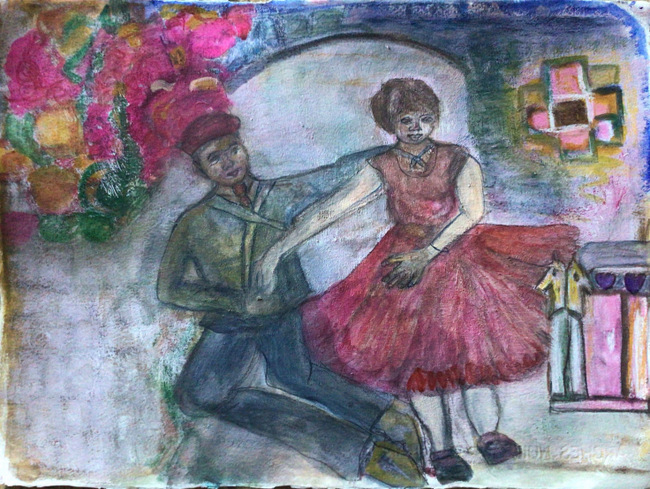Marisa Bevington
Response
A Visit from Mom
By Sarah Priestman
Inspiration piece
It’s an overcast Sunday; more Edinburgh than Arlington on what should be a sunny Memorial Day weekend. I pull the New York Times from its blue bag and rest my eyes on the front page, covered with the names of our pandemic’s dead, each with a one-line obit to capture their full lives. My brother died in 1994, so I know the trajectory that is living with loss, the emotional version of an MC Escher drawing: confusing up with down, unsure of one’s footing in space. The winter following his death I’d left a tight community of friends in New York for another in DC, where I’d attended American University, hoping a new beginning would provide solid ground.
My mother came to visit that April. Cherry blossoms bloomed. I’d rented a studio apartment in upper Northwest in one of the many buildings designed to attract the “working girls” who’d flocked to DC during the war, launching a housing boom. She had been among those girls, a secretary at the Pentagon. When we took a tour bus, she quizzed the guide about the famous building, and no, he did not know it was the first in the DMV with central air conditioning.
I’d picked her up at National Airport (no security restrictions, no Regan in the name), expecting her to need a nap. Instead, she wanted to go directly to the Smithsonian. Thus launched a week in which my 75 year-old mother exhausted me, traipsing around the Library of Congress, her old neighborhood in Park Fairfax, (a working girl, but living with her parents) and Glen Echo, where she’d ridden a street car to jitterbug with the boys who’d remained in DC. We drove to Fort Belvoir, where Pentagon secretaries had been invited to swim. We talked about the war. We talked about my brother.
She was grateful, she told me, that her generation “let women stay home,” that her life was focused on raising three kids. “That was enough,” she told me when I took her to Old Ebbitt’s Grill, splurging far beyond my means. “I loved it, and I’m proud of you kids.” Mary, with her acceptances into “all state” chorus, a degree in music from NYU. Jerry, building a pioneering career in what we then called “hi-tech.” Her youngest, now constructing a new life in the city her mother had once called home.
And now, in this shared city, we grieved Jerry. We both wept after The Bridges of Madison County at the Avalon Theatre, the loss of a lonely farm wife mirroring our own in the way another’s grief always will, another’s torn heart always returning us to the scars across our own. Like the names in my New York Times remind us: in this pandemic, we all grieve.
My mother would live another twenty years. Within five years from our visit, she’d cradle my adopted baby son with the tenderness she’d held us, and later hoist him onto her lap to draw, read, chatter together. Within ten she’d lose her husband, sitting alongside his body on their bed, my standing with a hand on her shoulder as she called him “Guillame,” his name, Bill, in French. Her fluency had landed her at the Pentagon’s Lend-Lease program, translating communications with our French allies. When she’d met my father, he still drove the recommissioned jeep he’d bought after his discharge (two Purple Hearts); I imagine this name was one she used, flirtatiously, just between them. I’d never heard it before.
Five years later she’d be in that same bed, and I’d slide in next to her, whispering memories: our wandering silently around the Tidal Basin beneath the endless pink blossoms; finding her father’s old entrance at the Department of Agriculture, where he’d taken a position after the depression had left him penniless, moving his family to DC for a new start; the vastness of the Spanish Ballroom, recalling the sweltering summer nights when she danced with the boys who stayed home.
———————-
Note: All of the art, writing, and music on this site belongs to the person who created it. Copying or republishing anything you see here without express and written permission from the author or artist is strictly prohibited.
